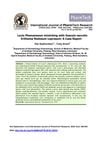 January 2023 in “Open Life Sciences”
January 2023 in “Open Life Sciences” VEGFR-2 activation is likely involved in hair follicle growth, survival, and development.

Social media data can help track and predict COVID-19 symptoms and trends.
 November 2022 in “CARDIOMETRY”
November 2022 in “CARDIOMETRY” A group has developed therapies that show promise for treating cancer and various other conditions.

Vitamin D is crucial for skin health and managing skin diseases.
 May 2022 in “International Journal for Research in Applied Science and Engineering Technology”
May 2022 in “International Journal for Research in Applied Science and Engineering Technology” Iron supplements combined with Quilib lotion effectively treat hair loss in people with iron deficiency anemia.
 May 2022 in “Acta Scientific Women's Health”
May 2022 in “Acta Scientific Women's Health” A woman lost over 80% of her hair due to a condition called telogen effluvium after having COVID-19.
 May 2022 in “Gastroenterology”
May 2022 in “Gastroenterology” Targeting NETs may help reduce fibrosis in Crohn's disease.
 December 2021 in “The Sri Lanka Journal of Dermatology”
December 2021 in “The Sri Lanka Journal of Dermatology” COVID-19 can cause various skin issues, including rashes and lesions.

Wild African goats have genetic adaptations for surviving harsh desert conditions.
 July 2021 in “Research Square (Research Square)”
July 2021 in “Research Square (Research Square)” Semecarpus anacardium leaf extract fights breast cancer and extends survival in mice.
 September 2020 in “Journal of Investigative Medicine”
September 2020 in “Journal of Investigative Medicine” Omics techniques are needed to understand the scalp microbiome's role in alopecia areata for new treatments.
 September 2020 in “Research Square (Research Square)”
September 2020 in “Research Square (Research Square)” Researchers found that certain RNA sequences play a role in yak hair growth and these sequences are somewhat similar to those in cashmere goats.
 January 2020 in “bioRxiv (Cold Spring Harbor Laboratory)”
January 2020 in “bioRxiv (Cold Spring Harbor Laboratory)” Semecarpus anacardium leaf extracts may offer safe, effective cancer treatment alternatives.
 January 2020 in “International Journal of PharmTech Research”
January 2020 in “International Journal of PharmTech Research” A man with severe leprosy developed painless ulcers and numbness, treated successfully with multiple drugs and vitamins.

Different drugs are used to manage breeding, prevent or end pregnancy, and treat reproductive issues in dogs and cats.
 December 2018 in “Neuroradiology”
December 2018 in “Neuroradiology” MRI helps distinguish between pituitary adenomas and craniopharyngiomas, guides treatment for pediatric CNS tumors, and assesses rhinocerebral mucormycosis with a high mortality rate in transplanted patients.
 October 2018 in “Journal of Clinical Research in Pediatric Endocrinology”
October 2018 in “Journal of Clinical Research in Pediatric Endocrinology” Children with classic congenital adrenal hyperplasia have thicker heart fat and more heart and blood vessel risk factors, especially if their condition is not well-controlled.

New treatments for hair loss show promise, including plasma, stem cells, and hair-stimulating complexes, but more research is needed to fully understand them.
 July 2018 in “Elsevier eBooks”
July 2018 in “Elsevier eBooks” Some drugs can cause reversible hair loss, but certain chemotherapy drugs may lead to permanent hair loss; drugs can also change hair color and texture.
 July 2018 in “Elsevier eBooks”
July 2018 in “Elsevier eBooks” Telogen Effluvium is a common, usually reversible hair loss condition, often improved by removing the trigger and possibly treated with various products, though their effectiveness is uncertain.

Alopecia Areata is treated with drugs and therapies to reduce inflammation and immune response.
 April 2018 in “Journal of Investigative Dermatology”
April 2018 in “Journal of Investigative Dermatology” Higher levels of nidogen1 and type IV collagen are found in basal cell carcinoma compared to normal skin.
 April 2018 in “Journal of Investigative Dermatology”
April 2018 in “Journal of Investigative Dermatology” CREB, a protein that can promote cancer traits, is controlled by β-catenin in skin cancer cells.
 April 2018 in “Journal of Investigative Dermatology”
April 2018 in “Journal of Investigative Dermatology” The document concludes that ERBB2 mutations are common in extramammary Paget disease and may respond to systemic treatments like cancer immunotherapy.
 April 2018 in “Journal of Investigative Dermatology”
April 2018 in “Journal of Investigative Dermatology” FOL-005, a hair growth promoter, acts locally on mouse skin where injected and could be a promising hair loss treatment.
 January 2018 in “Stem cells in clinical applications”
January 2018 in “Stem cells in clinical applications” Exosomes show promise for tissue repair and regeneration with advantages over traditional cell therapies.

Losing weight and eating better are key to managing metabolic syndrome and its related conditions.
 December 2017 in “Springer eBooks”
December 2017 in “Springer eBooks” Transplant patients often get skin problems, with treatments varying by condition.

Stem cells regenerate tissues and their behavior varies by environment, suggesting the hematopoietic system model may need revision.
 March 2017 in “Fundamental & Clinical Pharmacology”
March 2017 in “Fundamental & Clinical Pharmacology” The model and estimator can predict drug exposure in kidney transplant patients well.






























